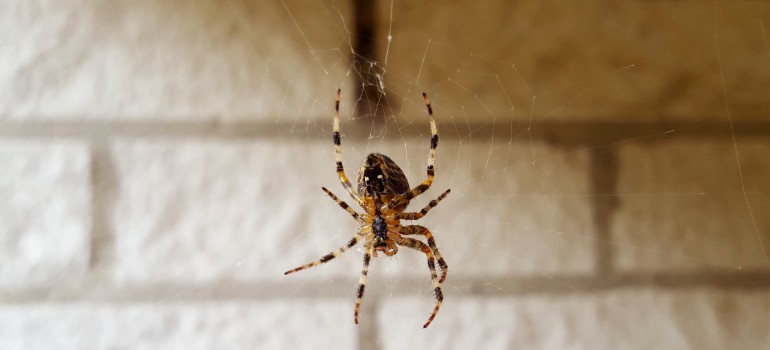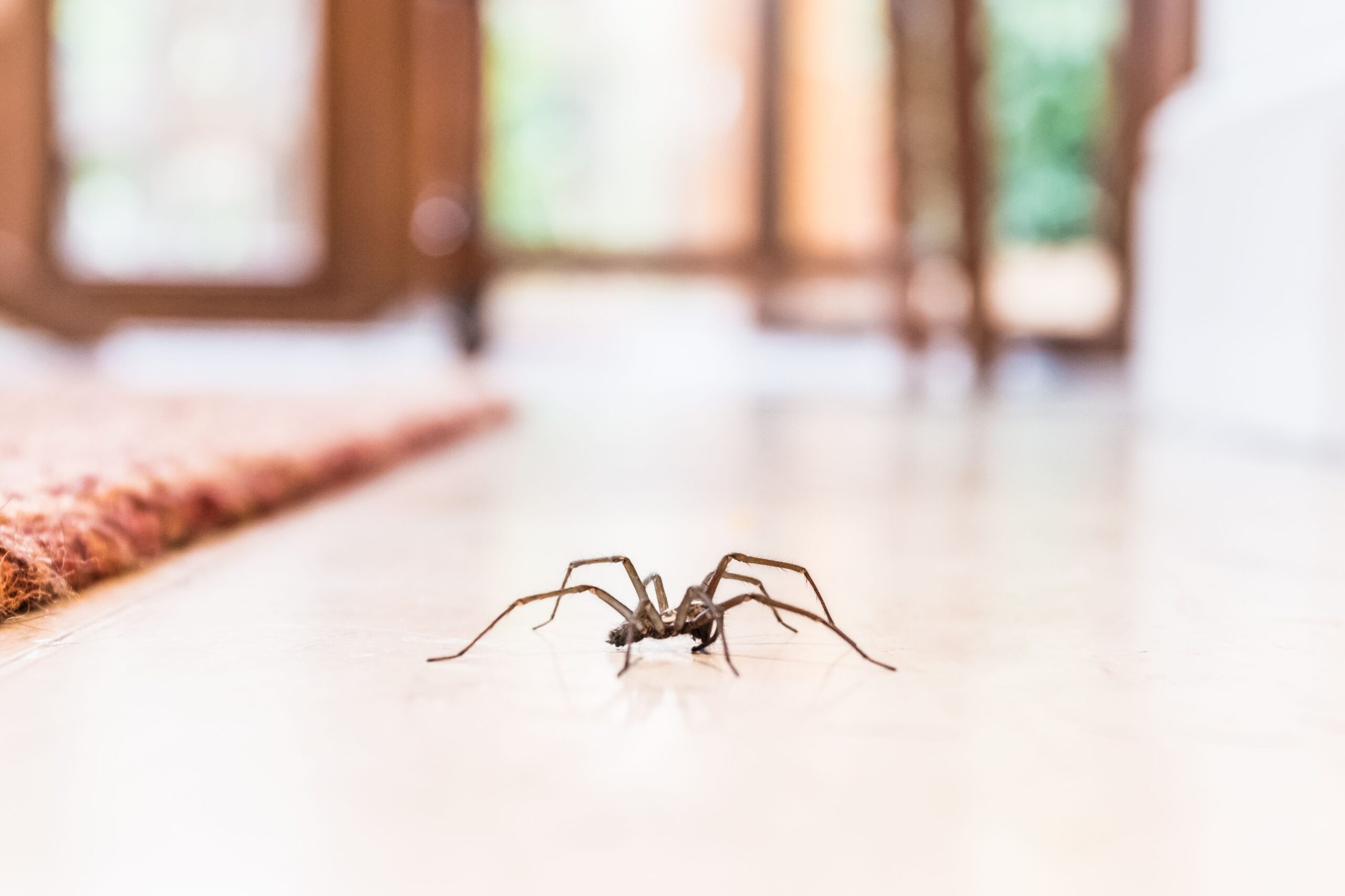Generally, spiders can reside in a room for days to months, as long as suitable conditions persist.
The length of time a spider remains in your room varies based on factors like species, available food, shelter, and room conditions.
However, if your room has a food supply and suitable hiding spots, a spider might stay longer. Cleaning regularly and disturbing their habitat could prompt them to leave.
Spiders might stay if they find a stable food source and safe shelter, but they can also move around. To remove a spider, capture it gently and release it outside.
What Are the Key Factors Impacting Spider Stay Duration?
Amidst the delicate threads of the natural world, the factors governing spider stay duration unveil a web of intricacies worth exploring.
Spider Species and Preferences:
Different spider species exhibit varied behaviors and preferences. Some species are more adapted to indoor environments, while others thrive outdoors.
Moreover, spiders that prefer indoor habitats might stay longer if they find suitable conditions for their survival.
Availability of Food Sources:
Spiders primarily feed on insects, and the presence of a consistent food source plays a crucial role in their stay duration.
However, if your room has a significant population of insects, spiders are more likely to remain, as they have a reliable source of sustenance.
Suitability of Shelter and Hiding Spots:
Spiders seek out sheltered areas where they can build webs and hide from predators. The availability of suitable hiding spots like corners, cracks, and crevices can encourage spiders to establish their homes in your room.
Environmental Conditions and Climate:
Spiders are ectothermic creatures, meaning their body temperature is regulated by the environment.
Furthermore, if your room provides a comfortable temperature and humidity level, it can be more inviting for spiders to stay. Extreme conditions, such as excessive heat or cold, might prompt spiders to seek better environments.
Reproductive Cycles and Mating Habits:

Spiders might enter your room in search of a mate or a suitable place to lay eggs. During their reproductive cycles, they might exhibit different behaviors, including staying in a location that provides safety for their eggs. Once their reproductive goals are met, they might move on.
What Are The Considerations for Spider Presence?
Delving into the realm of arachnid behavior, an investigation into the considerations influencing spider presence reveals a captivating tapestry of ecological and environmental factors.
Benefits of Having Spiders in Indoor Environments:
Spiders can serve as natural pest controllers by feeding on insects that could otherwise become a nuisance in your room.
Moreover, their presence contributes to ecological balance and reduces the need for chemical insecticides.
Ecological Balance: Spiders help control the population of insects, maintaining a healthy ecosystem.
Reduced Pest Infestations: By preying on pests, spiders can help minimize the presence of unwanted insects.
Potential Concerns Related to Spider Presence:
While spiders offer benefits, certain considerations might make their presence undesirable to some individuals.
Phobias and Fear: Many people have arachnophobia, an irrational fear of spiders, which can cause discomfort and anxiety.
Web Clutter: Spiders can create webs that might appear unsightly and require regular cleaning.
Bites and Venom: While most spiders are harmless to humans, there is a potential risk of bites, and some species can have venomous effects.
What Are The Strategies for Encouraging or Discouraging Spider Stay?
Balancing on the edge of fascination and repulsion, the art of orchestrating spider stay or dissuasion demands a nuanced understanding of tactics.
Maintaining Cleanliness and Reducing Clutter:
A clean and clutter-free environment reduces potential hiding spots for spiders. Regular cleaning, including vacuuming corners and under furniture, can discourage spiders from settling in your room.
Furthermore, minimizing dust and debris also makes the space less appealing for insects, which in turn reduces the spider’s food source.
Regular Removal of Spider Webs and Egg Sacs:
Spiders often build webs to catch prey and lay eggs. Removing these webs and egg sacs eliminates their hard work and discourages them from staying.
However, keep in mind that spiders might rebuild their webs if conditions remain suitable.
Minimizing Insect Presence to Limit Food Source:
A significant reason spiders might choose to stay indoors is the availability of insects to feed on. In addition, using insect screens on windows and doors, fixing leaks to prevent moisture buildup (which attracts insects). And promptly addressing any pest infestations can limit the spider’s food source and make your room less attractive to them.
Addressing Gaps and Crevices that Serve as Entry Points:
Spiders can enter your room through gaps in windows, doors, and walls. Sealing these openings with weather stripping, caulking, or mesh screens can prevent spiders from entering in the first place. This can be an effective proactive approach to minimizing their presence.
How to Understand Potential Spider Behavior Responses?
Navigating the intricate world of potential spider behavior responses requires an exploration of their nuanced reactions.
Spiders Adapting to Disturbances or Changes in Environment:
Spiders are known for their adaptability. If their web or habitat is frequently disturbed, they might move to a less disturbed area within your room.
Similarly, changes in lighting, temperature, or other environmental factors might lead them to seek more suitable conditions elsewhere.
Spiders Exploring Different Areas Based on Instincts and Needs:
Spiders are opportunistic creatures that explore their surroundings to find resources and suitable conditions.
However, if a spider senses a shortage of food, or if environmental conditions become less favorable, they might explore other areas in search of better opportunities for survival and reproduction.
What Of Human-Spider Coexistence?

Exploring the intricate dynamics of human-spider coexistence unveils a delicate interplay between fear, fascination, and the necessity
Balancing a Spider-Friendly Environment with Personal Comfort:
Achieving a balance between maintaining a spider-friendly environment and your personal comfort is essential.
Moreover, understanding the benefits of spiders, such as natural pest control, can help foster a positive coexistence. However, if fear or discomfort is a significant factor, you can implement strategies to minimize their presence while still appreciating their role in the ecosystem.
Spider-Friendly Zones: Designate specific areas where you allow spiders to reside, such as less frequented corners or spaces farther from your direct living areas.
Regular Monitoring: Keep an eye on spider populations and adjust your strategies based on your comfort level.
Ethical Considerations of Spider Removal and Relocation:
When deciding to remove or relocate spiders, ethical considerations come into play. Spiders are living creatures with their own place in the ecosystem. Before taking action, consider:
Impact on Ecosystem: Removing spiders can disrupt the natural balance and lead to an increase in insect populations.
Species Preservation: Some spider species might be rare or beneficial. Consider conserving them rather than removing them.
What Technique do you follow for Removing of Spiders?
Embracing a humane approach to spider management involves a repertoire of techniques
Gentle Capture Methods Using Containers:
If you decide to remove a spider from your room, using gentle capture methods ensures the safety of both you and the spider. Here’s how:
- Prepare a Container: Use a jar or cup with a wide opening and a lid.
- Approach Calmly: Slowly approach the spider without causing sudden movements that might startle it.
- Slide the Container: Gently place the container over the spider, ensuring it’s completely covered.
- Slide the Lid: Carefully slide a thin material (like paper or cardboard) under the container to trap the spider.
- Secure the Lid: Once the spider is on the paper, slowly place the lid on the container.
Responsible Release of Captured Spiders Outdoors:
When releasing a captured spider outdoors, consider the following:
- Habitat Selection: Choose an appropriate location that matches the spider’s natural habitat.
- Distance from Home: Release the spider a good distance from your home to avoid its immediate return.
- Safety: Avoid releasing spiders in areas where they might face immediate danger, such as busy roads or harsh weather.
FAQ’s
Will a spider leave me alone in my room?
Spiders typically avoid human interaction and focus on finding food and shelter. If undisturbed, they’re likely to stay in hidden spots.
Is it safe to sleep in a room with a spider in it?
Yes, most spiders are harmless to humans. They usually stay hidden and are more interested in insects than people.
Do spiders like the light?
Spiders generally prefer darker areas, as bright light can make them vulnerable to predators and drying out.
Do spiders sleep at night?
Spiders don’t have traditional sleep patterns, but they do become less active during the night, conserving energy.
Are spiders scared of us?
Spiders don’t experience fear like humans do, but they might retreat if they sense vibrations or sudden movements.
What to do if you see a spider in your room?
If you’re comfortable, you can gently capture it using a container and release it outdoors. Otherwise, leave it be; it’s likely harmless and beneficial.
Final Thought
In conclusion, the duration of a spider’s stay in your room depends on a complex interplay of factors, including species preferences, available food sources, shelter conditions, environmental elements, and reproductive cycles.
While spiders can contribute to ecological balance by controlling insect populations, their presence can also raise concerns related to phobias and potential risks.
Moreover, balancing a spider-friendly environment with personal comfort is essential, and strategies such as maintaining cleanliness, sealing entry points, and minimizing insect presence can influence their stay.
Ultimately, finding the right equilibrium between human preferences and ecological considerations can guide decisions about managing spider presence. Acknowledging the benefits spiders offer while addressing concerns can lead to a more informed and compassionate approach to living alongside these fascinating creatures.















